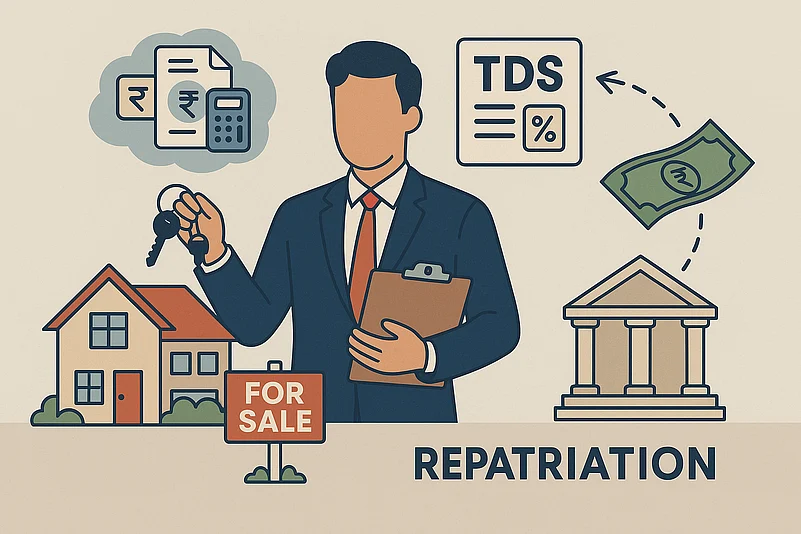
Summary of this article
NRIs selling property in India face capital gains tax and TDS.
Buyers must deduct TDS at 20 per cent, 12.5 per cent, or 30 per cent, depending on gains.
Long-term capital gains are taxed at 20 per cent with or 12.5 per cent without indexation.
NRIs need Form 15CA/CB and RBI compliance for repatriating sale proceeds.
When a non-resident Indian (NRI) sells property in India, not only does he or she need to pay capital gains taxes, but they also need to factor in tax deducted at source (TDS). The NRI does not pay TDS; it is the responsibility of the buyer to deduct the TDS and deposit it.
Capital Gains Implications
In case the property is a short-term capital asset, i.e., held for not more than two years, there is a difference in the income tax implications between when a resident sells property in India and when an NRI sells the same property in India. For an NRI, the tax has to be paid on the profit, i.e., short-term capital gains at slab rates, which would generally be 30 per cent plus cess and surcharge as applicable.
However, when a resident sells the same property, tax has to be paid at 20 per cent plus cess and surcharge as applicable. “For a long-term capital asset, i.e., held for more than two years, the tax rate is the same at 20 per cent with the indexation benefit (for property purchased before 23rd July 2024) or at 12.5 per cent without the indexation benefit (for property purchased on or after 23rd July 2024), plus cess and surcharge as applicable,” says Vivek Jalan, partner, Tax Connect Advisory Services.
How TDS Is Charged
TDS on the purchase of property is also different when a resident sells property in India and when an NRI sells the same property in India. For the purchase of property from NRIs, TDS has to be deducted @20 per cent/12.5 per cent (plus surcharge and cess) on the entire agreement value for LTCG and 30 per cent for STCG. The 12.5 per cent rate applies to long-term capital gains on property sold without indexation (as per Budget 2024 changes), while the 20 per cent rate applies when the seller opts for indexation, adjusting the property’s cost for inflation.
NRIs can apply for a lower TDS certificate if the actual tax liability is significantly less.
Rules For Repatriation
An NRI should follow the laid-down rules by RBI for repatriation of funds, which say sales proceeds should not be more than USD 1 million in a calendar year per PAN. “To repatriate funds, 15 CA/CB certifications are required by the bank. “15CB is a certified document containing all transfer details obtained by a chartered accountant. The sale proceeds should be first deposited into the NRE/FCNR account, and once the tax compliance is done, funds can be transferred from the NRO account of the NRI,” says Deepak Kumar Jain, Founder and CEO, TaxManager.in, the tax advisory.
“Double Taxation Avoidance Agreements (DTAAs) typically do not offer relief for capital gains on real property in India,” says Jalan.










